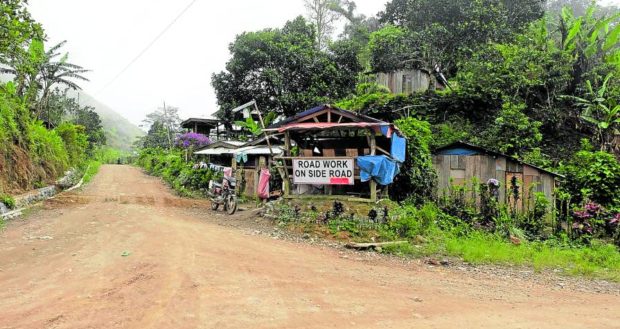
ROAD TO MINE SITE | Sagittarius Mines Inc. funds the road repair leading to its mine site in Barangay Danlag, Tampakan, South Cotabato, as seen in this photo taken on Jan. 16, 2020. (Photo by BONG S. SARMIENTO)
DAVAO CITY, Davao del Sur, Philippines —The Catholic Church in South Cotabato is once again at the forefront of the fight against the possible lifting of the ban in the province on open-pit mining, the method that will be employed in the controversial Tampakan project, the largest untapped copper-gold minefield in Southeast Asia.
Fr. Jerome Millan, director of the Social Action Center of the Diocese of Marbel, said the local Catholic Church and its multisectoral support groups strongly opposed moves to amend the provincial government Environment Code that bans open-pit mining in South Cotabato.
“The lifting of the ban will open our province to all mining methods, including large-scale open-pit mining operations with huge and irreversible impacts to the environment and the communities, not only in our province but also in neighboring provinces and municipalities,” he said in a statement.
The diocese and its allied groups held a protest on Friday in Tampakan town to express their dismay over the public hearing recently held at the municipal gym geared toward the lifting of the ban provided by the Environment Code, the province’s landmark ordinance.
Rene Pamplona, advocacy officer of Convergence of Initiatives for Environment Justice Inc., one of the Church’s support groups, said they would consider legal actions if the ban would be lifted.
The provincial board has been deliberating petitions by promining advocates to lift the open-pit mining ban in the Environment Code, which was approved 12 years ago.
Vice Gov. Vicente de Jesus, the provincial board’s presiding officer, earlier said they decided to hold the public hearing in bigger venues to accommodate more people to hear the arguments of pro- and antimining proponents.
He said the next public forum would be on Feb. 24 in Koronadal City, the capital of South Cotabato.
Unconvinced
In August last year, the diocese launched a signature campaign to support its calls against the lifting of the ban on open-pit mining.
The group submitted 93,453 signatures to the provincial board in December last year. But the diocese has yet to receive an official response on their signature campaign from the provincial board, Millan said.
The petitioners said the provincial board should hold more public hearings in other towns in the province and for the board members to “listen to the voice of the people and ensure that this legislative process is toward protecting the people of the present and the generations to come, and providing all with a balanced ecology to live in.”
Millan said the Tampakan project “failed to convince them that it will bring genuine, sustainable and equitable development to the area.”
“It threatens our food supply, watersheds, water sources, the safety and well-being of the people,” he added. “[It] disregards environmental regulations. It even increases the risks of disasters due to climate change,” he said.
Tribes’ consent
Bae Dalena Samling, chieftain of Danlag Tribal Council backing the Tampakan project, pointed out that the indigenous peoples within the project site had “given their consent” to Sagittarius Mines Inc. (SMI) to mine the area through the certification precondition (CP), which the National Commission on Indigenous Peoples granted in September 2020 to SMI.
The CP is a certification that the indigenous communities have given their consent to the mining venture within their ancestral domain and that the free and prior informed consent process has been satisfactorily complied with by the company.
“Let the Tampakan project proceed commercial production,” Samling told the Inquirer earlier, noting the mining project’s economic benefits not just to tribal members but also to surrounding localities.
The project has the potential to yield an average of 375,000 tons of copper and 360,000 ounces of gold in concentrate per annum in the 17-year-life of the mine, according to a company study.
In 2017, the late Environment Secretary Gina Lopez banned open-pit mining across the country but her directive was lifted in December last year by Environment Secretary Roy Cimatu, who resigned recently due to health reasons.
Cimatu’s order came eight months after President Duterte signed Executive Order No. 130, lifting the moratorium on new mining agreements to spur economic growth in the country.